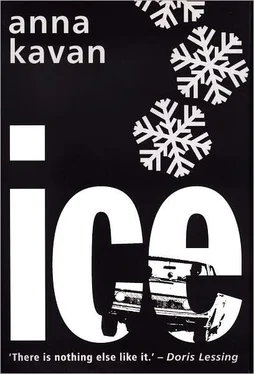I could not get over the deterioration in their relationship. While she was happy I had dissociated myself, been outside the situation. Now I felt implicated, involved with her again.
I heard that the girl had left home suddenly. No one knew where she was. The husband thought she might have gone abroad. It was only a guess. He had no information. I was agitated and asked endless questions, but no concrete facts emerged. ‘I know no more than you. She simply vanished, I suppose she’s entitled to go if she wants to—she’s free, white and twenty-one.’ He adopted a facetious tone, I could not tell if he was speaking the truth. The police did not suspect foul play. There was no reason to think harm had come to her, or that she had not gone away voluntarily. She was old enough to know her own mind. People were constantly disappearing; hundreds left home and were not seen again, many of them women unhappily married. Her marriage was known to have been breaking up. Almost certainly she was better off now, and only wanted to be left in peace. Further investigation would be resented and lead to more trouble.
This was a convenient view for them, it excused them from taking action. But I did not accept it. She had been conditioned into obedience since early childhood, her independence destroyed by systematic suppression. I did not believe her capable of taking such a drastic step on her own initiative: I suspected pressure from outside. I wished I could talk to someone who knew her well, but she seemed to have had no close friends.
The husband came to town on some mysterious business, and I asked him to lunch at my club. We talked for two hours, but in the end I was none the wiser. He persistently treated the whole affair lightly, said he was glad she had gone. ‘Her neurotic behaviour nearly drove me demented. I’d had all I could take. She refused to see a psychiatrist. Finally she walked out on me without a word. No explanation. No warning.’ He spoke as if he was the injured party. ‘She went her own way without considering me, so I’m not worrying about her. She won’t come back, that’s one thing certain.’ While he was away from home, I took the opportunity of driving down to the house and going through the things in her room, but found nothing in the way of a clue. There was just the usual collection of pathetic rubbish: a china bird; a broken string of fake pearls; snapshots in an old chocolate box. One of these, in which a lake reflected perfectly her face and her shining hair, I put into my wallet.
Somehow or other I had to find her; the fact remained. I felt the same compulsive urge that had driven me straight to the country when I first arrived. There was no rational explanation, I could not account for it. It was a sort of craving that had to be satisfied.
I abandoned all my own affairs. From now on my business was to search for her. Nothing else mattered. Certain sources of possible information were still available. Hairdressers. Clerks who kept records of transport bookings. Those fringe characters. I went to the places such people frequented, stood about playing the fruit machines until I saw a chance of speaking. Money helped. So did intuition. No clue was too slender to follow up. The approaching emergency made it all the more urgent to find her quickly. I could not get her out of my head.
I had not seen all the things I remembered about her. During my first visit I was in their living-room, talking about the Indris, my favourite subject. The man listened. She went to and fro arranging flowers. On an impulse I said the pair of them resembled the lemurs, both so friendly and charming, and living together so happily here in the trees. He laughed. She looked horrified and ran out through the french window, silvery hair floating behind her, her bare legs flashing pale. The secret, shady garden, hidden away in seclusion and silence, was a pleasant cool retreat from the heat of summer. Then suddenly it was unnaturally, fearfully cold. The masses of dense foliage all round became prison walls, impassable circular green ice-walls, surging towards her; just before they closed in, I caught the terrified glint of her eyes.
On a winter day she was in the studio, posing for him in the nude, her arms raised in a graceful position. To hold it for any length of time must have been a strain, I wondered how she managed to keep so still; until I saw the cords attached to her wrists and ankles. The room was cold. There was thick frost on the window panes and snow piled up on the sill outside. He wore the long uniform coat. She was shivering. When she asked, ‘May I have a rest?’ her voice had a pathetic tremor. He frowned, looked at his watch before he put down his palette. ‘All right. That’ll do for now. You can dress.’ He untied her. The cords had left deep red angry rings on the white flesh. Her movements were slow and clumsy from cold, she fumbled awkwardly with buttons, suspenders. This seemed to annoy him. He turned away from her sharply, his face irritable. She kept glancing nervously at him, her mouth was unsteady, her hands would not stop shaking.
Another time the two were together in a cold room. As usual, he wore the long coat. It was night, freezing hard. He had a book in his hand, she was doing nothing. She looked cold and miserable, huddled up in a thick grey loden coat with a red and blue check lining. The room was silent and full of tension. It could be felt that neither of them had spoken for a long time. Outside the window, a twig snapped in the iron frost with a sound like a handclap. He dropped the book and got up to put on a record. Instantly she began to protest. ‘Oh, no! Not that awful singing, for heaven’s sake!’ He ignored her, went on with what he was doing. The turntable started revolving. It was a record I had given them from my tape recording of the lemurs’ song. To me, the extraordinary jungle music was lovely, mysterious, magical. To her it was a sort of torture, apparently. She covered her ears with her hands, winced at the high notes, looked more and more distraught. When the record ended and he re-started it without a moment’s pause, she cried out as if he had struck her, ‘No! I won’t listen to it all over again!’ threw herself at the mechanism, stopped it so abruptly that the voices expired in uncanny wailing. He faced her angrily. ‘What the hell do you think you’re doing? Have you gone off your head?’ ‘You know I can’t stand that horrible record.’ She seemed almost beside herself. ‘You only play it because I hate it so much…’ Tears sprang unchecked from her eyes, she brushed them away carelessly with her hand.
He glared at her, said: ‘Why should I sit in silence for hours just because you don’t choose to open your mouth?’ His angry voice was full of indignant resentment. ‘What’s wrong with you, anyhow, these days? Why can’t you behave like a normal being?’ She did not answer, dropped her face in her hands. Tears dripped between her fingers. He gazed at her with a disgusted expression. ‘I might as well be in solitary confinement as alone with you here. But I warn you I’m not going to put up with it much longer. I’ve had enough. I’m sick and tired of the way you’re carrying on. Pull yourself together, or else—’ With a threatening scowl, he went out, banging the door behind him. A silence followed, while she stood like a lost child, tears wet on her cheeks. Next she started wandering aimlessly round the room, stopped by the window, pulled the curtain aside, then cried out in amazement.
Instead of the darkness, she faced a stupendous sky-conflagration, an incredible glacial dream-scene. Cold coruscations of rainbow fire pulsed overhead, shot through by shafts of pure incandescence thrown out by mountains of solid ice towering all round. Closer, the trees round the house, sheathed in ice, dripped and sparkled with weird prismatic jewels, reflecting the vivid changing cascades above. Instead of the familiar night sky, the aurora borealis formed a blazing, vibrating roof of intense cold and colour, beneath which the earth was trapped with all its inhabitants, walled in by those impassable glittering ice-cliffs. The world had become an arctic prison from which no escape was possible, all its creatures trapped as securely as were the trees, already lifeless inside their deadly resplendent armour.
Читать дальше












